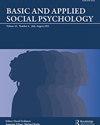金钱与合作的关系:来自经济学和心理学的证据
IF 1.8
3区 心理学
Q2 PSYCHOLOGY, SOCIAL
引用次数: 0
摘要
本文章由计算机程序翻译,如有差异,请以英文原文为准。
The Relationship between Money and Cooperation: Evidence from Economics and Psychology
Abstract This paper addresses the non-linear effect that money has on cooperative behavior. In economic theory, money is assumed to have a positive effect on cooperation, by providing incentives to agents. The evidence from field experiments indicates instead that small positive incentives can be detrimental to cooperation, crowding out intrinsic motivation, while larger incentives crowd it back in. The same happens, in the opposite direction, with negative incentives. By reviewing the existing qualitative evidence from economics and psychology, the paper proposes a possible mechanism that can lead to this non-linear effect, based on the methodology and the experimental results from economics and psychology. Money increases mutual benefits but decreases altruism, having a negative effect on cooperation when introduced in lesser amounts.
求助全文
通过发布文献求助,成功后即可免费获取论文全文。
去求助
来源期刊

Basic and Applied Social Psychology
PSYCHOLOGY, SOCIAL-
CiteScore
4.50
自引率
12.50%
发文量
7
期刊介绍:
Basic and Applied Social Psychology (BASP) emphasizes the publication of outstanding research articles, but also considers literature reviews, criticism, and methodological or theoretical statements spanning the entire range of social psychological issues. The journal will publish basic work in areas of social psychology that can be applied to societal problems, as well as direct application of social psychology to such problems. The journal provides a venue for a broad range of specialty areas, including research on legal and political issues, environmental influences on behavior, organizations, aging, medical and health-related outcomes, sexuality, education and learning, the effects of mass media, gender issues, and population problems.
 求助内容:
求助内容: 应助结果提醒方式:
应助结果提醒方式:


